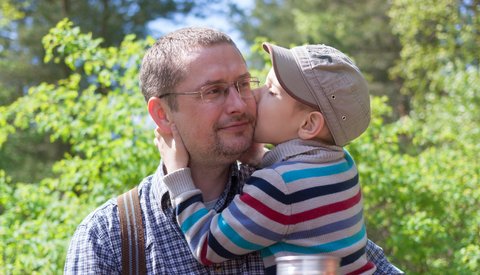Perhaps President Abraham Lincoln said it best: “There is nothing stronger than gentleness.” That especially goes for parenting — but let’s face it: Caring for a child is one of the world’s toughest jobs, and it can induce great frustration, discouragement and anger in even the most understanding and patient people.
Remaining calm during difficult times can be really tough — but it’s also profoundly important for parents to do so. Losing your temper and overreacting only leads to saying or doing something you regret later. Remaining calm will allow you to think before you act. Your child will respect you and see you as a positive role model, and you’ll even feel better about yourself.
So, here are three steps to staying calm:
1. Stop. Don’t act impulsively. Take a deep breath. Relax your body. Calm your mind.
2. Tune in. Be aware of your self-talk and your body signals. Your self-talk either will agitate you or calm you down. No one makes us angry. Anger is always a choice. You can choose to be angry, or you can choose not to be angry. When your anger escalates, you are saying something to yourself that is making you angrier. For example, if you say to yourself, “My child will never learn to listen and respect me,” you will feel hopeless and give up. Be aware of your body signals, such as shallow breathing, elevated heartbeat, clenched jaws and flushed cheeks. Your body is telling you that you are physically and emotionally escalating.
3. Act. Once you are calmed down and in control, you are much more likely to think logically, resulting in constructive problem solving. You can now share your thoughts and feelings in a clear, honest and appropriate way, or decide on another course of action that will be helpful to your child. When in doubt, say nothing. If you are not sure how to respond, defer until later. You can say, “I’ll get back to you later; Dad and I will discuss this and let you know.”
Respond therapeutically
There are two ways of reacting to your child that increase anger and conflict:
1. A mutual reaction. This is when you behave the same way as your child. For example, your child yells and threatens, and you yell and threaten back. Hostility increases hostility.
2. A complementary reaction. This is when you give in to your child’s demands or cheats. This includes backing down out of fear, giving endless warnings and pleading for good behavior.
Mutual and complementary reactions are non therapeutic — and they will usher your child to becoming more manipulative. You will feel helpless and hopeless, and your relationship with your child will be built almost entirely on conflict.
Healing parents give therapeutic responses. They remain calm, yet, in a firm and serious way convey the following message: “I will not accept your behavior, will do all in my power to help you change, and I will not become aggressive or abusive. Your goals is connection, not control. When you think only in terms of “Who’s the boss?” you invite control battles and power struggles. You want to convey instead parental authority, but not at the expense of the relationship. Your determined and clam tone of voice, facial expressions, body language and words will be transmitted to your child, and his anger, aggression and agitation will slowly subside.



Trackbacks/Pingbacks